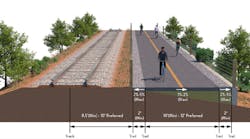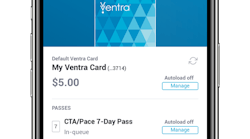Metra Board of Directors approves 2024 operating and capital budgets
The Metra Board of Directors has approved a $1.1 billion operating budget for 2024 that includes a major revision to the agency’s fare structure and a new mix of fare products. It also approved a $574.9 million capital budget that continues significant investment in railcars, bridges and stations.
The operating budget is 4.9 percent higher than the 2023 budget (excluding $65 million in added costs that will be reimbursed by Northern Indiana Commuter Transportation District). The increase is largely driven by expected inflationary (general, medical premiums, fuel, insurance) and contractual (union agreements) increases.
The operating budget incorporates a revision to the Metra fare structure that was proposed over the summer. Under the new structure, which will take effect on Feb. 1, 2024, fares will be equal to or lower than pre-pandemic levels. Major changes include:
- Replacing the existing 10-zone distance-based structure with a simplified four-zone structure.
- Discontinuing the promotional $6 and $10 Day Passes and $100 Super Saver Monthly Pass.
- Replacing the 10-Ride Ticket with a Day Pass 5-Pack available only in the Ventra app.
- Discontinuing “incremental fares” – a surcharge to travel beyond the zones indicated on a ticket.
The operating budget projects Metra will start the year at 47 percent of pre-pandemic (2019) ridership and finish the year at approximately 54 percent of pre-pandemic levels. This results in a projection of $243.9 million in system-generated revenues, mostly fares. To cover the rest of its budgeted operating costs, Metra will use $560.4 million in regional sales taxes and $223.7 million in federal COVID-relief funding.
The capital budget of $574.9 million funds 97 projects throughout the system. Approximately 63 percent of the budget will fund work in four categories:
- Bridge and retaining wall replacement and rehabilitation: $143.8 million
- Stations and parking rehabilitations: $77.5 million
- Yard improvements, including facility acquisitions: $71.1 million
- Railcar rehabilitation: $67.6 million.
The capital budget is funded by:
- $252.1 million in federal formula funding
- $117 million United States Department of Transportation Mega grant for Union Pacific North Line bridges
- $73.8 million in Illinois PAYGO funds
- $130 million in Regional Transportation Authority (RTA) of Northern Illinois bonds
- $2 million in RTA Section 5310 funds



